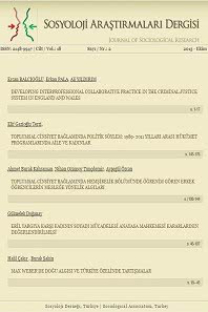Sermaye Olarak Yaş ve Eğitim: Türkiye'de Ev-İçi Hizmet Sektöründe Çalışan Kadınlar Üzerine Karşılaştırmalı Bulgular
Bu makalenin amacı, Türkiye Cumhuriyeti'nde ev-içi hizmet sektöründe çalışan farklı uluslardan kadınların, yaş ve eğitim durumlarını tespit etmek ve bu iki değişkenin yapılan işlere göre farklılık gösterip göstermediğini araştırmaktır. Ev-içi hizmet sektöründe son yıllarda artan yabancı kadın çalışanların Türkiye vatandaşı kadın çalışanlara göre daha avantajlı konuma gelmelerinde bu iki değişkenin bir sermaye olarak etkin olup olmadığna bakılacaktır. Bu çalışmada, ev-içi hizmet sektöründe alt-hizmet dalları da kapsanacak şekilde, 1999-2003 yılları arasında belirli aralıklar ile İstanbul 'da yapılan alan araştırmalarından yaş ve eğitim ile ilgili elde edilen veriler,, tanımlayıcı ve karşılaştırmalı bir çerçeve içerisinde sunulmuştur.
The Age and Education as a Capital: The Comparative Findings on Women Working in in-House Service in Turkey
This paper aims to determine the age and the levels of education of those women who have been working in In-House Services, and to examine whether or not these two variables are differentiated according to the sub-works i.e., cleaning, childcare, and baby-sitting so on. The impacts of these two variables as a capital on the lately increasing employment of migrant women workers in comparison to that of women of Turkey will be investigated further. Moreover, the findings about the age and education values of the women workers in In-House Service Sector collected from the field works from 1999 to 2003 in Istanbul are presented in a descriptive and comparative framework.
___
- BECKER, G. (1993) Human Capital: A Theoretical and Empirical Analysis, with Special Reference to Education.Chicago: The University of Chicago Press.
- BOURDİEU, P. (1986) "The Forms of Capital" in J. G. Richardson (Ed.), Handbook of Theory and Research for the Sociology of , Education.New York; Westport, Conn.: Greenwood Press.
- COLEMAN, J. (1988) "Social Capital in the Creation of Human Capital" American Journal of Sociology, 94(Issue Supplement), 95-120.
- ECEVİT, Y. (1985) "Üretim Ve Yeniden-Üretim Sürecinde Ücretli Kadın Emeği" Yapıt(9), s. 72-93.
- ERTÜRK, Y. (1990) "Doğu Anadolu'da Modernleşme Ve Kırsal Kadın". îç. Ş. Tekeli (Ed), Kadın Bakış Açısından 1980'ler Türkiye'sinde Kadmlar.İstanbul: İletişim Yayınları.
- GÖKÇE, B. (1990) "Türk Kadını Ve Çağdaşlaşma". Hacettepe Üniversitesi İktisadi ve İdari Bilimler Dergisi, 5(2).
- HAVEMAN, R. H., & Wolfe, B. (1984) "Schooling and Economic Weil-Being: The Role of Non-Market Effects". Journal of Human Resources, 7P(Summer), pp. 378-407.
- HEALY, T. (2001) The Human Capital Approach and the Oecd: How Clear Is the International Agenda and Where Is It Going?Queen's International Institute on Social Policy.
- KALAYCIOĞLU, S., & H. R. Tılıç (2000) Evlerimizdeki Gündelikçi Kadinlar.Ankara: Su Yayınları.
- KALTON, G. (1983) Introduction to Survey Sampling.Beverly Hills: Sage.
- KELLY, P. F. (1995) "Social and Cultural Capital in the Urban Ghetto: Implications for the Economic Sociology of Imigration". in A. Portes (Ed.), The Economic Sociology of Immigration: Essays on Networks, Ethnicity, and Entrepreneurship.New York: Russell Sage Foundation.
- MORROW, V. (1999) "Conceptualising Social Capital in Relation to the Well-Being of Children and Young People: A Critical Review". The Editorial Board of The Sociological Review, pp. 744-765.
- OECD. (1998) Human Capital Investment, an International Comparison.Paris: OECD. OZYEGİN, G. (2001) Untidy Gender: Domestic Service in Turkey. Philadelphia: Temple University Press.
- PUTNAM, R. D. (1995) "Bowling Alone: America's Declining Social Capital". Journal of Democracy, 6(1), pp. 65-79.
- PUTNAM, R. D. (2001) "Social Capital: Measurement and Consequences", in J. F. Helliwell (Ed.), The Contribution of Human and Social Capital to Sustained Economic Growth and Weil-Being.Paris: OECD.
- SİRMAN, N. (1989) "Feminism in Turkey: A Short History". New. Perspectives on Turkey, 3(1), pp. 1-34.
- SİRMAN, N. (1990) Köy Ünitesinin Tanımlanması. Toplum ve Bilim (48-49), 95-102.
- TEKELİ (Ed.). (1990) Kadın Bakış Açısından 1980'ler Türkiye'sinde Kadınlar. İstanbul: İletişim Yayınları.
- ÜNAL, B. (2003) "Natasas Versus Marias: All against Ayses". Paper presented at the Migrant Domestic Workers in the Middle East: Becoming Visible in the Public Sphere? Boğaziçi University, Istanbul.
- ISSN: 2148-9947
- Yayın Aralığı: Yılda 2 Sayı
- Başlangıç: 2010
- Yayıncı: Sosyoloji Derneği
Sayıdaki Diğer Makaleler
Türkiye'de Bir Etnik Grup ve Oy Davranışı Üzerine İnceleme
